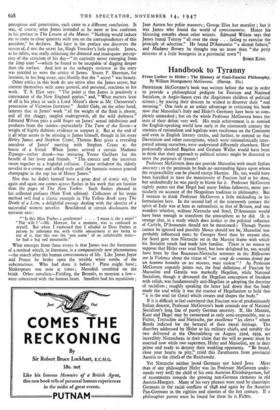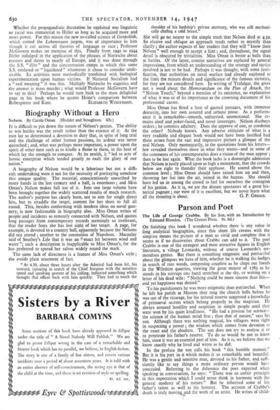Handbook to Tyranny
From Luther to Hitler : The History of Nazi-Fascist Philosophy. By William Montgomery McGovern. (Harrap. 21s.) PROFESSOR MCGOVERN'S book was written before the war in order to provide a philosophical pedigree for Fascism and National Socialism, in Anglo-Saxon eyes the illegitimate children of political science ; by tracing their descent he wished to discover their " real meaning." One feels at an unfair advantage in criticising his book now that Mussolini's Italy and Hitler's Germany have been so com- pletely unmasked ; but on the whole Professor McGovern bears the tests of their defeat very well. His main achievement is to remind the English-speaking world how early in the nineteenth century the enemies of rationalism and legalism were vociferous on the Continent and even in English literary circles, and further, to remind us that Darwinism and other conceptions, which were rationalistically inter- preted among ourselves; were understood differently elsewhere. How profoundly shocked Bagehot and Graham Wallas would have been to think that their approach to political science might be distorted to serve the purposes of tyrants!
Professor McGovern does not provide Mussolini with much Italian ancestry ; in the peninsula he finds no outstanding figure upon whom the responsibility can be placed except Mazzini. He, too, would have been horrified to have the monstrosity of Fascism laid at his door, but undoubtedly he was partly to blame for it. Professor McGovern rightly points out that Hegel had many Italian followers, more par- ticularly on account of the Neapolitan tradition in philosophy. But I venture to think Professor McGovern a little misleading in his formulation here. In the second half of the nineteenth century the spirit of Italy was at least as rationalistic as that of Britain, and one wonders whether, without Nietzsche and Sorel, D'Annunzio would have been enough to transform the atmosphere as he did. (It is strange that, in a study which does justice to the political influence of Carlyle, D'Annunzio should not be mentioned.) Though Pareto cannot be ignored and possibly Mosca should not be, Mussolini was probably influenced more by Georges Sorel than by anyone else, for Sorel gave him Nietzsche set in the Marxist frame with which his Socialist youth had made him familiar. There is no reason to suppose that Hitler ever read Sorel, but how delighted he, too, would have been by that Rousseau-Nietzsche sentence in the Reflexions sur la Violence about the virtue of "un coup de couteau donne par un homme honnete en ses moeurs, mais violent"! As Professor McGovern cogently points out, the final definition of Fascism by Mussolini and Gentile was markedly Hegelian, while National Socialism, though it devoured the Hegelian conception of freedom with relish, was fundamentally anti-Hegelian in adopting the doctrine of racialism ; roughly speaking the latter laid down that the body made the soul while it was the essence of Hegelianism to hold that "it is the soul (or Geist) which creates and shapes the body."
If it is difficult to feel convinced that Fascism was of predominantly Italian descent, Professor McGovern's book reminds one of National Socialism's long line of purely German ancestry. If, like Mazzini, Kant and Hegel may be exonerated as only semi-responsible, not so Fichte, Treitschke and Nietzsche, par excellence "les clercs" whom Benda indicted for the betrayal of their moral heritage. The diatribes addressed by Hitler to his military chiefs, and notably the two delivered at the Obersalzberg on August 22nd, 1939, are incredibly Nietzschean in their claim that the will to power must be asserted now while two supermen, Hitler and Mussolini, are in their prime and ready to destroy their weakling opponents. " Be brutal, close your hearts to pity," cried this Zarathustra from provincial Austria to the chiefs of the Reichswehr.
Yet Nietzsche neither loved Germans nor hated Jews. More than of any philosopher Hitler was (as Professor McGovern under- stands very well) the child of his own Austrian Kleinbiirgertum, full of resentments towards the growing non-German elements in old Austria-Hungary. Many of his very phrases were used by chauvinist Germans in the racial conflicts of 1848 and again by the Austrian Pan-Germans in the eighties and nineties of the last century. If a philosopher parent must be found for them he is Fichte.
Whether the propagandistic decoration he exploited was linguistic or racial was immaterial to Hitler so long as he acquired more and more power. For this reason the new so-called science of Geopolitik, which coined the Lebensraum jargon, was of importance to him though it cut across all theories of language or race ; Professor McGovern makes no mention of this. Finally from 1940 to 1944 Hitler indulged in the application of the phrases of Nietzsche about masters and slaves to nearly all Europe, and it was done through the S.S. " elite " and the concentration (limps in which this same S.S. enslaved or " liquidated " whomever it chose to consider unde- sirable. Its activities were methodically 'Combined with biological experimentation upon human victims. If National Socialism had a " real meaning " it was this. Multiply Nietzsche by eugenics and the answer is mass murder ; what would 'Professor McGovern have to say to this? 'Perhaps he would turn back to the most delightful page in his book where he quotes Heine's comparison between































 Previous page
Previous page